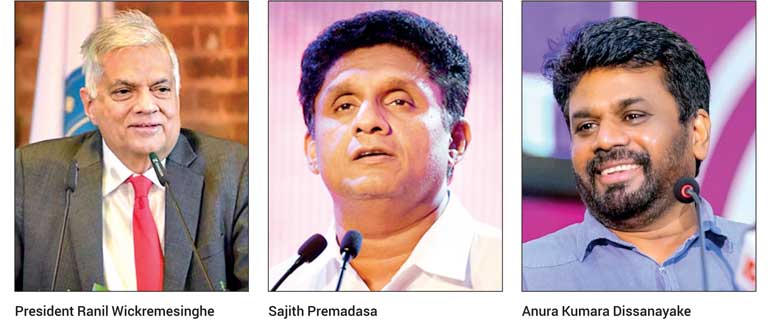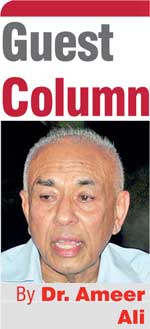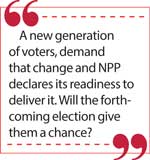Sunday Feb 15, 2026
Sunday Feb 15, 2026
Friday, 5 April 2024 00:30 - - {{hitsCtrl.values.hits}}

 “Macroeconomic policy can never be devoid of politics; it involves fundamental trade-offs and affects different groups differently” (Joseph Stiglitz).
“Macroeconomic policy can never be devoid of politics; it involves fundamental trade-offs and affects different groups differently” (Joseph Stiglitz).
The role of IMF intervention
The IMF drug is beginning to show signs of effectiveness by producing few random indicators of economic recovery. With strict capital controls and tightened trade rules, the rupee is appreciating against the dollar and the buying rate of the dollar has dipped below Rs.300. Unavoidably, the rupee has also appreciated against the country’s trading partners, which is bound to affect exports. Headline inflation has tumbled down from about 70% to below 6%, and the country’s foreign reserves had reached almost $4,500 million by January this year. A booming tourism industry and disappearance of queues are additional indicators of stability. But there is a long way to go to achieve steady growth. Debt restructuring is yet to be completed and after that debt servicing would bring additional pressure on foreign reserves. Above all, there are several unknowns in global economic arena which may hurt recovery efforts. However, President Ranil Wickremasinghe (RW) is so elated by the recovery signs that he went to the extent of declaring that he would inject the IMF drug with the force of law if the need arises. His opponents, except the ones from NPP, after initially raising concerns about the unfair social cost of that drug have come to realise that they have no better alternative to offer than to recommend the same drug when they come to power. Yet, neither RW and his opponents except NPP are not prepared to look at the big picture and admit the fact that the economic crisis is only one among a multiplicity of crises and that the main root of the poly-crisis lies deep in the very womb of the nation’s so-called democratic governance. IMF has also warned that economic recovery is at a knife edge and could slip back unless governance reforms are pursued with determination. But, as the life of the current parliament and that of the presidency are nearing an end the country’s attention is shifting rapidly and perhaps dangerously from economics to politics. Political developments during the last few weeks indicate that Presidential Election would precede a General Election, and according to RW the date of that election would be announced only after July when the IMF program is scheduled to come to an end. Does he mean to argue that IMF would be out of Sri Lanka after July? Its $2.9 billion EFF would be disbursed over eight tranches and IMF would continue overseeing progress long after July. The fact of the matter is RW wants to use the remaining months of his presidency to entice, cajole and even threaten his opponents to win their support for his candidature.
Presidential election speculations
The politics behind this tentative recovery would run in two or three different directions depending on whether the contest for presidency going to be a two-sided or three-cornered race. Until a couple of weeks ago, popular expectation was that it would be a three-cornered fight among RW from the UNP-SLPP coalition, Sajith Premadasa (SP) from SJB and Anura Kumara Dissanayake (AKD) from NPP. In that case, RW would try to capitalise on the positive indicators of recovery with warning to voters not to jeopardise the race by changing the horse halfway. SP would highlight the disproportionate cost borne by the workers and the poor and try to capitalise on their prolonging misery; and the third would go beyond the recovery and argue for a system change to tackle the poly-crisis. Fearing the rising popularity of the third, inter-party horse-trading appears to have begun in earnest to make the contest two-sided between the current system’s common candidate RW and system changer AKD.
Era of awakening
 Without exaggeration it should be admitted that the Aragalaya awakening of 2022 was a landmark event which highlighted what the country actually needed to overcome its multiple crises. Those agitators emerging from a qualitatively different generation of voters finally realised that the economic crisis of Sri Lanka was only symptomatic of a fundamental systemic crisis and hence they demanded “system change”. But they never elaborated on what they really meant by it. Their slogans “Gota Go Home” and “No 225” only simplified an otherwise value loaded and complex agenda. The first slogan delivered the result almost immediately, but not the second. The widening intergenerational divide made Gotabaya Rajapaksa (GR) presidency untenable, and there was no conspiracy to sack him as he dubiously claims in his book. His departure marked the success of a spontaneous uprising, which was not prepared to put up with a system that bankrupted the economy with planned mismanagement and in the name of Buddhism. The violence that ensued was not originated by the agitators but by thugs hired by GR’s brother and Prime Minister Mahinda Rajapaksa (MR). But disappointingly, the response from the 225 was to continue with the same system after replacing GR with RW and with invitation to IMF to repair the economic damage. All this were done legally but lacked legitimacy. In that context, the very invitation to IMF was not only an economic necessity but also a political imperative. The time has now arrived for the people to express their final judgment on what had been done so far in their name, but without their mandate.
Without exaggeration it should be admitted that the Aragalaya awakening of 2022 was a landmark event which highlighted what the country actually needed to overcome its multiple crises. Those agitators emerging from a qualitatively different generation of voters finally realised that the economic crisis of Sri Lanka was only symptomatic of a fundamental systemic crisis and hence they demanded “system change”. But they never elaborated on what they really meant by it. Their slogans “Gota Go Home” and “No 225” only simplified an otherwise value loaded and complex agenda. The first slogan delivered the result almost immediately, but not the second. The widening intergenerational divide made Gotabaya Rajapaksa (GR) presidency untenable, and there was no conspiracy to sack him as he dubiously claims in his book. His departure marked the success of a spontaneous uprising, which was not prepared to put up with a system that bankrupted the economy with planned mismanagement and in the name of Buddhism. The violence that ensued was not originated by the agitators but by thugs hired by GR’s brother and Prime Minister Mahinda Rajapaksa (MR). But disappointingly, the response from the 225 was to continue with the same system after replacing GR with RW and with invitation to IMF to repair the economic damage. All this were done legally but lacked legitimacy. In that context, the very invitation to IMF was not only an economic necessity but also a political imperative. The time has now arrived for the people to express their final judgment on what had been done so far in their name, but without their mandate.
A pragmatic vision for systemic reform
NPP has undertaken the task of translating the Aragalaya demand for system change into reality. Its methodology is to realise that change through social revolution and transformation of a decadent political culture. What provides credibility to NPP’s political platform is its leaders familiarity with theoretical radicalism and lessons learnt from the failure of its practice in the past. NPP party therefore represents a new ideology of pragmatic radicalism, and instead of the revolutionary and resurrectionary violent path of the predecessors is resorting to the ballot box with a socio-economic and political agenda. The manifesto, which the party is expected to release soon should reflect this crucial transformation. A new constitution eschewing ethnocratic majoritarianism and embracing secular democracy should be the cornerstone of that manifesto. Economically, NPP’s advocacy of a market friendly strategy should start by cleansing the market of its artificial rigidities which are clandestinely introduced with state support. It is also willing to go along with the IMF reform agenda as long as they assist strengthening the domestic production sector. It has declared its readiness to continue friendly relations with neighbouring countries and particularly with India. NPP’s appeal to the national minorities to join in building a democracy without destroying the country’s ethnic and cultural pluralism has more substance than RW’s rhetoric on ethnic reconciliation. These are encouraging signs of the party’s vision and approach towards tackling the poly-crisis. If these do not imply system change, what else?
Challenges and opportunities for economic progress
Finally, there is the historic communal element in Sri Lankan politics that would derail the tentative economic recovery if it were to raise its ugly head once again. In 2020 and in the immediate aftermath of the Easter Sunday mayhem GR, MR and their SLPP captured power from the platform of political Buddhism. That campaign driven by Buddhist demagogues and their apparatchiks targeted the Muslim community and swept the poll with bloodshed. However, an a-political and a-religious Aragalaya forced the resignations of GR and MR, and since then the electoral damage to SLPP had been severe. That party had no choice but to seek shelter under the coalition umbrella of UNP and its leader RW. The new president, schooled in the chicanery politics of his uncle JR, exploited SLPP’s vulnerability to the maximum. Yet, SLPP is a wounded elephant. GR’s presentation of his conspiracy book to the Mahanayakas for their blessing, Ven. Gnanasara Thero’s imprisonment on a case filed by two Muslim appellants for maligning Islam, which has provoked a section of the sangha to agitate for a public pardon, and recent revelations by the former president Maithripala Sirisena about Easter massacre’s mastermind are instances that would compel SLPP strategists to recalculate their chances of capturing power by playing the Buddhist card. That would imperil economic recovery.
Sri Lanka cannot afford to tread along the same path with too many potholes to reach RW’s magical destination of a Valhalla in 2048. A U-turn or system change is imperative. A new generation of voters, demand that change and NPP declares its readiness to deliver it. Will the forthcoming election give them a chance?
(The writer is attached to Business School, Murdoch University, W. Australia)